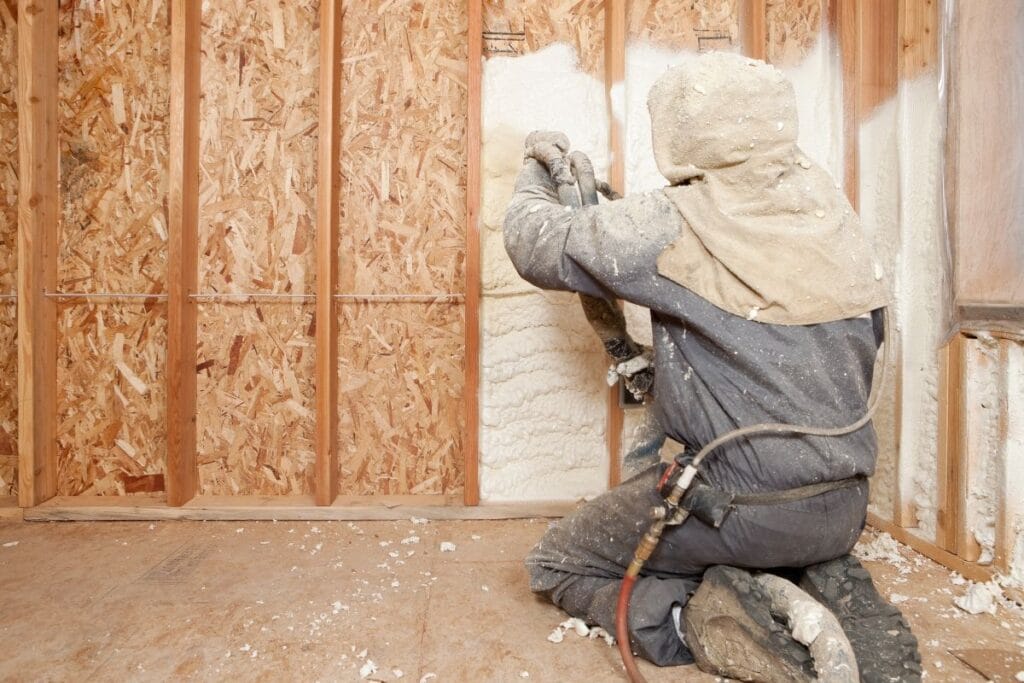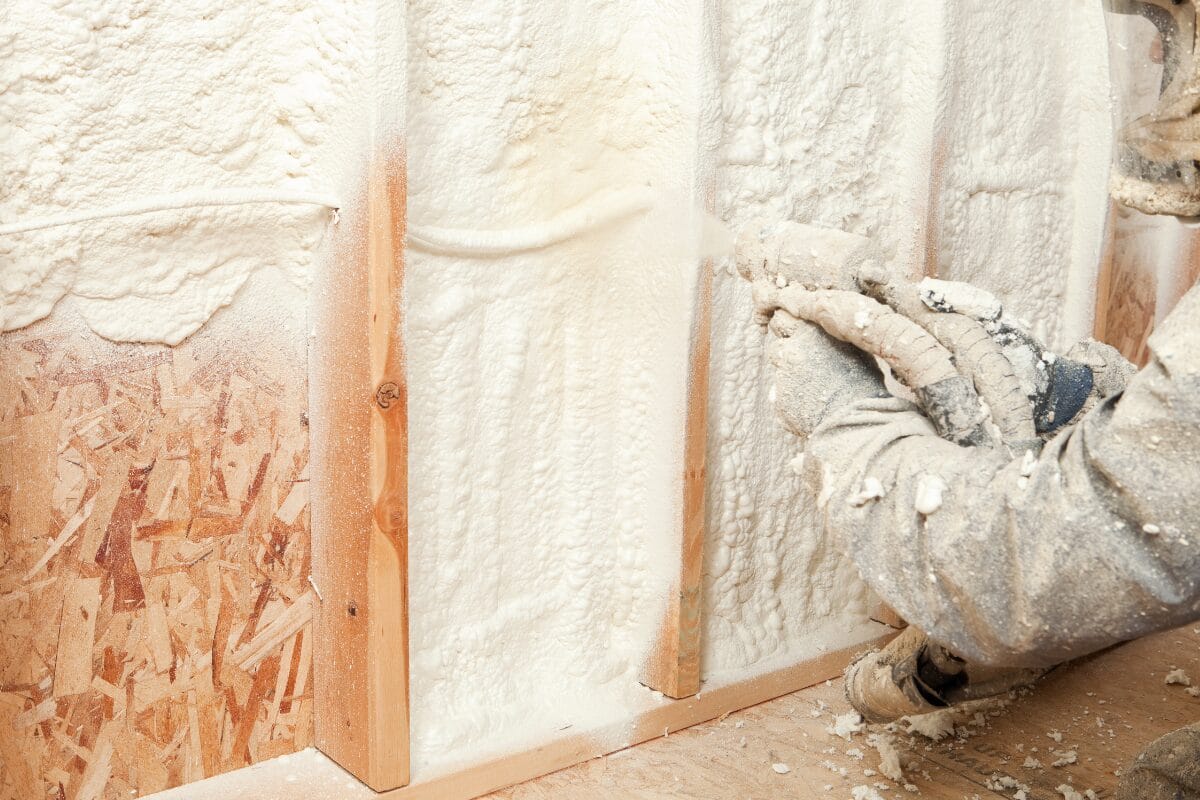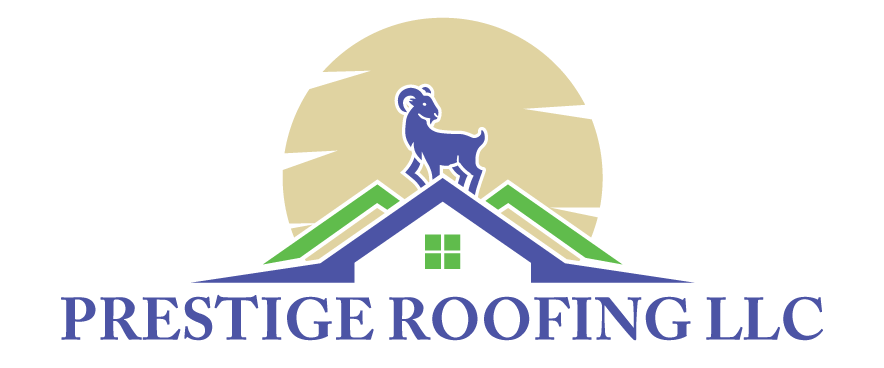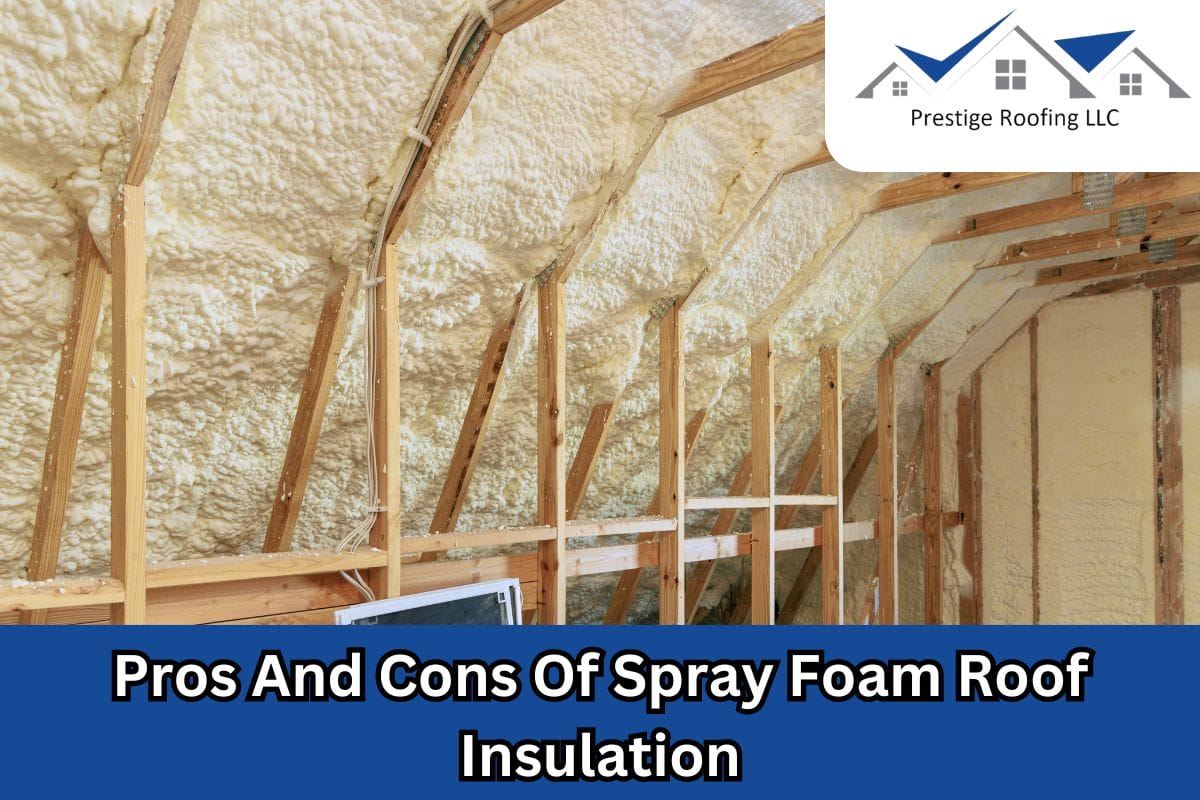If you are researching the best types of insulation for your roof, you’ve probably come across spray foam insulation. Spray foam roof insulation involves spraying liquid foam on the underside of the roof surface, which expands and hardens to form a protective layer. This method is one of the most popular types of roof insulation because it can seal cracks and gaps and provides an excellent thermal barrier.
However, as a proactive homeowner, you shouldn’t just follow popular trends and instead should weigh the benefits against the potential drawbacks of this type of insulation before you make your decision.
In this blog post, we will discuss the pros and cons of spray foam roof insulation so that you can get the full picture and make an informed decision.
What Is Spray Foam Roof Insulation?

Spray foam roof insulation is a method of insulating roofs by spraying a special foam material onto the underside of the roof’s surface in the attic space. This foam expands and hardens, creating a protective layer that fills every crack and crevice to create a seamless barrier. It helps to prevent heat loss during cold weather and keeps air cooler inside your home during hot weather.
Spray foam insulation is favored for its effectiveness and versatility, as you can apply it to various types of roofs. It also provides better energy efficiency compared to traditional methods of insulation. That’s why it is popular among homeowners in Wisconsin who want to improve their property’s insulation and protect their home from extreme temperatures.
Pros Of Spray Foam Roof Insulation
Now let’s move to the core of the topic. Spray foam roof insulation offers numerous benefits for homeowners and building owners seeking efficient and effective insulation solutions. Below are some of the key advantages of using spray foam roof insulation:
Seamless Application
Spray foam insulation has the ability to be applied seamlessly not only under the roof and in attics but also in between walls. Unlike traditional insulation materials that often come in pre-cut pieces, spray foam is sprayed as a liquid that expands as it dries. This process creates a uniform and airtight seal, minimizing air leakage and enhancing energy efficiency. The absence of gaps ensures that there are no weak points where heat or cold air can escape, resulting in better insulation performance.
Closed-Cell Properties
Spray foam insulation’s closed-cell properties make it waterproof and resistant to leaks. Unlike other types of open insulation materials, the closed-cell structure forms a tight barrier, preventing water infiltration. This feature ensures long-term protection against moisture-related issues such as leaks and water damage.
Longevity and Durability
One of the major advantages of spray foam insulation is its resistance to common issues such as moisture, mold, and pests. These factors can degrade other insulation materials over time, leading to reduced effectiveness and the need for replacement. However, spray foam’s durability allows it to withstand these challenges, ensuring that it maintains its insulation properties for years. This longevity not only provides peace of mind for homeowners but also offers long-term cost savings by avoiding the need for frequent replacements.
Higher R-Value Than Other Options
Spray foam insulation boasts a higher R-value compared to other insulation types. The R-value measures the material’s thermal resistance, indicating how effectively it can prevent heat transfer. With its superior insulation properties, spray foam helps to maintain consistent indoor temperatures, regardless of external weather conditions. This results in improved comfort and potential energy savings over time.
Versatile
Spray foam insulation is versatile and can be used on various surfaces such as roofs, walls, attics, and crawl spaces. This makes it suitable for a range of construction projects that include residential homes and commercial buildings. Whether used during new construction or for retrofitting existing structures, spray foam can adapt to different construction needs.
Soundproofing Qualities
Spray foam insulation acts as an efficient and effective sound barrier. It can reduce noise transmission between rooms or from outside sources, creating a quieter and comfortable indoor environment. This makes spray foam insulation particularly beneficial for buildings located in noisy urban areas or near busy roads, where soundproofing is essential for homeowners’ comfort.
Sustainable and Environment Friendly
Spray foam insulation is recognized for its eco-friendly characteristics, which are rooted in its sustainability. Its exceptional energy efficiency helps lower carbon emissions by reducing the need for heating and cooling in buildings, which is why it is a preferred choice for environmentally conscious homeowners.
Cons Of Spray Foam Insulation
While spray foam insulation offers numerous benefits, it’s important to consider potential drawbacks before making a final decision.
Potential for Over Application
Over application of spray foam insulation poses the risk of causing bowing or warping of surfaces, particularly in tight spaces like attics. This can happen when the foam expands beyond what the structure can accommodate, exerting pressure and distorting the surfaces. You must be careful and hire an experienced roofing contractor to make sure that you achieve the correct thickness and coverage during installation. Careful planning and application techniques are crucial to ensure optimal performance without compromising structural integrity.
Initial Cost
Spray foam insulation initially costs more than standard options like fiberglass or cellulose. This initial expense might discourage homeowners who are mindful of their budgets. However, it’s important to consider the long-term benefits, such as energy savings, that spray foam insulation can provide.
Health-Related Issues
When spray foam insulation is applied, it releases chemicals called volatile organic compounds (VOCs) while it dries. These chemicals can pollute indoor air and may be harmful, especially for people with breathing problems. It’s important to be aware of this because the fumes from the spray foam can affect air quality in your home. For those sensitive to respiratory issues, it’s essential to take precautions or consider alternative insulation options to avoid potential health risks.
Installation Challenges with Weather Conditions
Spray foam insulation application can be tricky in extreme weather conditions. Cold temperatures can possibly slow down the curing process, leading to improper installation and potential issues like poor adhesion. Similarly, hot and humid weather can cause the foam to expand too quickly, resulting in uneven coverage and reduced effectiveness. It’s essential to consider weather conditions during installation to ensure optimal performance and avoid complications with spray foam insulation.
Professional Installation Required
Spray foam insulation demands professional installation due to the necessity for specialized equipment and expertise. DIY attempts may result in uneven application or insufficient coverage, diminishing its effectiveness. Without proper training, achieving the precise thickness and coverage required for optimal insulation can be challenging. Professional roof installers have the skills and knowledge to ensure a thorough and effective application that maximizes the benefits of spray foam insulation.

How Much Does Spray Foam Roof Insulation Cost?
Typically, spray foam insulation costs between $600 to $10,000, with the average project cost hovering around $5,000. Several factors influence these costs, including the size of the area that has to be insulated, the type of spray foam used, and the complexity of the installation process. While initial costs may seem higher than traditional insulation methods, the long-term benefits, such as improved energy efficiency and lower utility bills, often outweigh the upfront expenses.
Best Roof Installers In Wisconsin
We hope that this list of pros and cons of spray foam roof insulation will help you make an informed decision about your roofing needs. If you are looking to schedule a roof replacement or any other roofing project, you need a skilled and experienced roofing contractor.
For professional assistance, contact Prestige Roofing in Wisconsin. Our contractors specialize in residential roofing services including installing insulation for your roof. Call us at (920) 791-0414 for the best roofing services.

